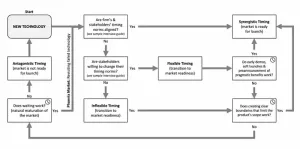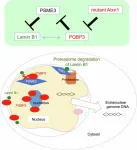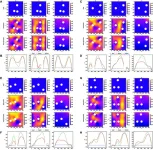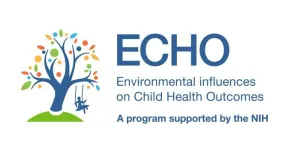(Press-News.org) Today the U.S. Department of Energy (DOE) announced the creation of two new Energy Innovation Hubs. One of the national hubs, the Energy Storage Research Alliance (ESRA), is led by DOE’s Argonne National Laboratory and co-led by DOE’s Lawrence Berkeley National Laboratory (Berkeley Lab) and Pacific Northwest National Laboratory (PNNL).
ESRA (pronounced ez-ruh) brings together nearly 50 world-class researchers from three national laboratories and 12 universities to provide the scientific underpinning to address the nation’s most pressing battery challenges, including safety, high-energy density and long-duration batteries made from inexpensive, abundant materials. ESRA’s primary aim is to push the boundaries of energy storage science to drive technological innovation and strengthen U.S. economic competitiveness.
“The demand for high-performance, low-cost and sustainable energy storage devices is on the rise, especially those with potential to deeply decarbonize heavy-duty transportation and the electric grid,” said Shirley Meng, ESRA director, chief scientist of the Argonne Collaborative Center for Energy Storage Science and professor at the Pritzker School of Molecular Engineering at the University of Chicago. “To achieve this, energy storage technology must reach levels of unprecedented performance, surpassing the capabilities of current lithium-ion technology. The key to making these transformative leaps lies in a robust research and development initiative firmly grounded in basic science.”
Leveraging decades of national investment in basic sciences, ESRA seeks to enable transformative discoveries in materials chemistry, gain a fundamental understanding of electrochemical phenomena at the atomic scale and lay the scientific foundations for breakthroughs in energy storage technologies.
“ESRA creates an energy storage research ecosystem with the mission to rapidly innovate, shorten the time between basic discovery and technology development, and train the next-generation workforce,” said Bryan McCloskey, ESRA deputy director for scientific thrusts and faculty engineer in the Energy Storage and Distributed Resources Division at Berkeley Lab.
“The demand for…energy storage devices is on the rise, especially those with potential to deeply decarbonize heavy-duty transportation and the electric grid.” — Shirley Meng, ESRA director; chief scientist, Argonne Collaborative Center for Energy Storage Science; and professor, UChicago Pritzker School of Molecular Engineering
The achievement of ESRA’s goals will lead to high-energy batteries that never catch fire, offer days of long-duration storage, have multiple decades of life and are made from inexpensive, abundant materials.
“ESRA will pave the way for innovative energy storage solutions that drive both U.S. prosperity and security,” said Argonne Director Paul Kearns. “As the lead laboratory for ESRA under the Department of Energy’s Office of Science, Argonne takes pride in spearheading this collaborative effort that unites world-leading experts and taps the impressive scientific resources available in national labs and academia.”
ESRA funding by the Department of Energy is up to $62.5 million for up to five years.
The Argonne-led hub will also place a central focus on training a diverse, next-generation battery workforce for future manufacturing needs through innovative training programs with industry, academia and government.
“Cultivating a diverse workforce dedicated to safeguarding America’s energy resilience is key to ESRA’s mission,” said Wei Wang, ESRA deputy director for crosscuts and director of the Energy Storage Materials Initiative at PNNL. “Through our strategic equity and inclusion initiatives, we plan to create a robust training ground for energy storage science from the undergraduate to postdoctoral levels.”
ESRA co-leads Berkeley Lab and PNNL together bring expertise that spans the energy storage landscape. Their state-of-the-art capabilities in energy storage technology discovery, modeling and simulation, and materials synthesis and characterization, complement those of Argonne. Together, these national laboratories will help reshape the future of energy storage.
Argonne is joined in the collaboration by 14 partners that are embedded in all aspects of ESRA: participation in each of the scientific thrusts, governance and development of the hub strategy, and training of the next generation of battery scientists and researchers. The collaboration among national laboratories and universities is crucial to discovering new materials, accelerating technology development and commercializing new energy storage technologies. The ESRA partners are:
Columbia University
Duke University
Lawrence Berkeley National Laboratory
Massachusetts Institute of Technology
Pacific Northwest National Laboratory
Princeton University
UC San Diego
UChicago
University of Houston
University of Illinois Chicago
University of Illinois Urbana-Champaign
University of Michigan
Utah State University
Xavier University
Energy Storage Research Alliance (ESRA), a U.S. Department of Energy (DOE) Energy Innovation Hub led by Argonne National Laboratory, brings together nearly 50 world-class researchers from three national laboratories and 12 universities to enable energy storage and next-generation battery discovery. ESRA will enable transformative discoveries in materials chemistry, gain a fundamental understanding of electrochemical phenomena at the atomic scale, lay the scientific foundations for breakthroughs in energy storage technologies, and train a next-generation battery workforce to ensure U.S. scientific and economic leadership.
Argonne National Laboratory seeks solutions to pressing national problems in science and technology by conducting leading-edge basic and applied research in virtually every scientific discipline. Argonne is managed by UChicago Argonne, LLC for the U.S. Department of Energy’s Office of Science.
The U.S. Department of Energy’s Office of Science is the single largest supporter of basic research in the physical sciences in the United States and is working to address some of the most pressing challenges of our time. For more information, visit https://energy.gov/science.
END
Department of Energy selects Argonne to lead national energy storage hub
The Energy Storage Research Alliance will focus on advancing battery technology to help the U.S. achieve a clean and secure energy future
2024-09-03
ELSE PRESS RELEASES FROM THIS DATE:
People eating beef are less likely to live near the industry’s pollution, Pitt researchers found
2024-09-03
Anyone who’s researched ways to lower their environmental impact has likely heard they should eat less meat, particularly beef. Even at scale, cows are an inefficient way to feed people — it takes nearly four tons of water to recoup one ton of beef, and many farming practices emit greenhouse gasses and pollutants.
University of Pittsburgh researchers are the first to trace one of those pollutants, nitrogen, along the U.S. beef supply chain at the county level. They found high spatial disconnect between where ...
Can technology turn exercise pain into pleasure?
2024-09-03
Virtual reality (VR) video games that combine screen time with exercise are a great way to get fit, but game designers face a major challenge – like with regular exercise, adherence to ‘exergames’ is low, with most users dropping out once they start to feel uncomfortable or bored.
Computer scientists at the University of Bath believe they’ve found a solution: create exergames that use sensors to continuously measure a person’s emotional state while they exercise, then tweak the game – for instance, making ...
When is the right time to launch new technologies?
2024-09-03
New research from Bayes Business School (formerly Cass) finds that being on the cutting edge of technology is not enough to ensure success in the market, and managers must strategically time launches to create a source of opportunity and credibility for the firm.
The study, led by Dr Thomas Robinson, Senior Lecturer in Marketing at Bayes, with Dr Ela Veresiu, Associate Professor of Marketing at Schulich School of Business, York University, Toronto, develops a framework for guiding organisations on the best situations for a product launch.
The research identifies four timing situations that can confront marketing managers. Knowing ...
Mayo researchers develop tool that measures health of a person’s gut microbiome
2024-09-03
ROCHESTER, Minn. — A team of Mayo Clinic researchers has developed an innovative computational tool that analyzes the gut microbiome, a complex ecosystem of trillions of bacteria, fungi, viruses and other microorganisms within the digestive system, to provide insights into overall well-being.
In a new study published in Nature Communications, the tool demonstrated at least 80% accuracy in differentiating healthy individuals from those with any disease. The tool was developed by analyzing ...
Unveiling the molecular mechanisms linking aging with neurodegenerative diseases
2024-09-03
Tokyo Medical and Dental University (TMDU) researchers elucidate the role of PQBP3 in stabilizing the nuclear membrane and its relationship to senescence and neurodegeneration
Tokyo, Japan – Aging is the prime cause of neurodegenerative diseases, such as Alzheimer’s disease, Parkinson's disease, and amyotrophic lateral sclerosis. But what exactly increases the prevalence of these brain disorders as one grows older? The molecular forces linking aging, cellular senescence, and the onset of these neurodegenerative conditions ...
Keep devices out of bed for better sleep – Otago study
2024-09-03
Despite what we’ve been led to believe, the timing of evening screen use, rather than the activity itself, negatively impacts youth sleep, a University of Otago study has found.
Current sleep guidelines recommend no screen use in the hour or two before bed. However, the researchers found screen time in the two hours before bed had little impact on youth sleep, it was screen time once in bed that caused problems.
Lead author Dr Bradley Brosnan, of the Edgar Diabetes and Obesity Research Centre, says screen time is a mainstay in adolescents’ bedtime routines, and sleep guidelines need to be revaluated to better reflect modern life.
Published in JAMA Pediatrics, ...
Dr. Torabi to study vulnerabilities in electric vehicle charging management systems
2024-09-03
Dr. Sadegh Torabi, Assistant Professor, Information Sciences and Technology, College of Engineering and Computing (CEC), and Research Fellow at the Center for Secure Information Systems (CSIS), is set to receive funding for the project: “Collaborative Research: CISE MSI: RPEP: OAC: Macroscopic and Microscopic Inference and Analysis of Vulnerabilities within EV Charging-Management Systems.”
Via this project, Dr. Torabi and his partners will establish a collaborative ecosystem among academia, industry, and the public sector to bolster the resilience of the EV Charging Infrastructure (CI). The critical nature of EV CI has made them targets for malicious attacks, often state-sponsored, ...
Think simpler, flow faster
2024-09-03
Analyzing and simulating fluid flow is a challenging mathematical problem that impacts various scenarios, including video game engines, ocean current modeling and hurricane forecasting. The core of this challenge lies in solving the Navier–Stokes equations, a set of classical equations that describe fluid dynamics. Recently, deep learning has emerged as a powerful tool to accelerate equation solving. Using this technique, a team designed a novel approach that can provide accurate solutions 1,000 times faster than traditional equation solvers. The team’s study was published June 26 in Intelligent ...
Eating fish but not omega-3 supplements during pregnancy associated with lower likelihood of autism diagnosis, NIH-funded study finds
2024-09-03
Eating any amount of fish during pregnancy was associated with about a 20% lower likelihood of autism spectrum disorder (ASD) diagnosis, particularly in females, and a slight reduction in autism-related traits in offspring, according to a new study funded by the Environmental influences on Child Health Outcomes (ECHO) Program at the National Institutes of Health.
However, researchers did not find the same association with supplements containing omega-3 fatty acids.
Fish is an important source of omega-3 fatty acids, an essential nutrient during pregnancy for supporting maternal health and child neurodevelopment. A recent analysis of ECHO Cohort data revealed that about ...
Study: racial and ethnic designation inaccuracies in children’s medical records may impede equity efforts
2024-09-03
ANN ARBOR, Mich. – Leaders at three Michigan hospitals aiming to address equity issues for pediatric patients wanted to start with inspecting data key to identifying potential inequities.
What they learned: much of those data are inaccurate.
A study from the Michigan Child Health Equity Collaborative, or Mi-CHEC, found substantial errors across the three health systems in racial and ethnic designations in their electronic medical records. Accuracy of these designations are important to clinical care improvement ...
LAST 30 PRESS RELEASES:
Nonprofit leader Diane Dodge to receive 2026 Penn Nursing Renfield Foundation Award for Global Women’s Health
Maternal smoking during pregnancy may be linked to higher blood pressure in children, NIH study finds
New Lund model aims to shorten the path to life-saving cell and gene therapies
Researchers create ultra-stretchable, liquid-repellent materials via laser ablation
Combining AI with OCT shows potential for detecting lipid-rich plaques in coronary arteries
SeaCast revolutionizes Mediterranean Sea forecasting with AI-powered speed and accuracy
JMIR Publications’ JMIR Bioinformatics and Biotechnology invites submissions on Bridging Data, AI, and Innovation to Transform Health
Honey bees navigate more precisely than previously thought
Air pollution may directly contribute to Alzheimer’s disease
Study finds early imaging after pediatric UTIs may do more harm than good
UC San Diego Health joins national research for maternal-fetal care
New biomarker predicts chemotherapy response in triple-negative breast cancer
Treatment algorithms featured in Brain Trauma Foundation’s update of guidelines for care of patients with penetrating traumatic brain injury
Over 40% of musicians experience tinnitus; hearing loss and hyperacusis also significantly elevated
Artificial intelligence predicts colorectal cancer risk in ulcerative colitis patients
Mayo Clinic installs first magnetic nanoparticle hyperthermia system for cancer research in the US
Calibr-Skaggs and Kainomyx launch collaboration to pioneer novel malaria treatments
JAX-NYSCF Collaborative and GSK announce collaboration to advance translational models for neurodegenerative disease research
Classifying pediatric brain tumors by liquid biopsy using artificial intelligence
Insilico Medicine initiates AI driven collaboration with leading global cancer center to identify novel targets for gastroesophageal cancers
Immunotherapy plus chemotherapy before surgery shows promise for pancreatic cancer
A “smart fluid” you can reconfigure with temperature
New research suggests myopia is driven by how we use our eyes indoors
Scientists develop first-of-its-kind antibody to block Epstein Barr virus
With the right prompts, AI chatbots analyze big data accurately
Leisure-time physical activity and cancer mortality among cancer survivors
Chronic kidney disease severity and risk of cognitive impairment
Research highlights from the first Multidisciplinary Radiopharmaceutical Therapy Symposium
New guidelines from NCCN detail fundamental differences in cancer in children compared to adults
Four NYU faculty win Sloan Foundation research fellowships
[Press-News.org] Department of Energy selects Argonne to lead national energy storage hubThe Energy Storage Research Alliance will focus on advancing battery technology to help the U.S. achieve a clean and secure energy future




